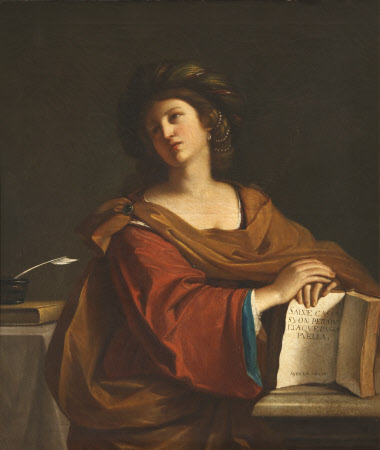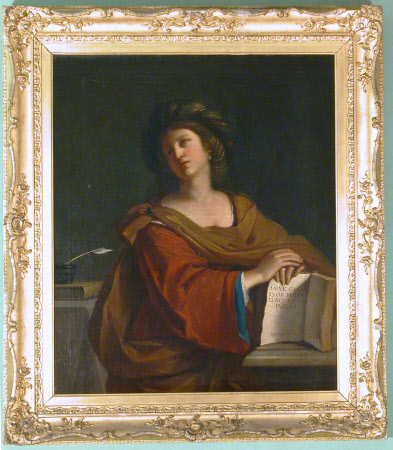The Samian Sibyl (after Guercino)
after Guercino (Cento 1591 – Bologna 1666)
Category
Art / Oil paintings
Date
1600 - 1699
Materials
Oil on canvas
Measurements
1445 x 1265 x 110 mm; 17 kg (Weight)
Place of origin
Bologna
Order this imageCollection
Osterley Park and House, London
NT 773345
Summary
Oil painting on canvas, The Samian Sibyl (after Guercino), after Guercino (Cento 1591 – Bologna 1666). A three-quarter length portrait of a woman who is sitting at a table with a second table behind her upon which sits another book. She wears voluminous red robes with blue cuffs and a brown cloak and tilts her head backwards towards the left. Both her hands rest on an open vertical book, displaying the Latin inscription within: 'SALVE CASTA/SYON PERMUL/TAQUE PASSA/PUELLA./SYBILLA SAMIA'. This is a variant of the original of 1651,of which there is a studio copy in the Uffizi, commissioned by Giuseppe Locatelli, an Italian nobleman, in which the Sibyl is wearing red robes with blue cloak and pink cuffs. It was in the Spencer collection, Althorp and accepted in lieu in 2012 and is now on display at the National Gallery, London. Guercino painted The Cumaean Sibyl for another client at the same time and that is now also in the National Gallery. The Sibyls- whose number is variously given, but was most commonly accepted as ten - were women reputed to have existed at or since the beginning of Classical Antiquity, who were imbued with the power of prophecy. They took their respective names from the places or countries in which they resided. One reason for the frequency with which they were later depicted in Europe was that, two centuries after the destruction of the original Sibylline Verses by fire in the Roman Civil Wars, a spurious set was concocted, apparently foretelling the Birth, Passion and Death of Christ. The inscription on this Sybil's book means 'Hail to thee, chaste Sion, and Virgin who has suffered much'. The original of this picture was painted in 1651, and is in a private collection; a studio copy is in the Uffizi.
Provenance
Given to the National Trust along with the Stourhead house, its grounds, and the rest of contents by Sir Henry Hugh Arthur Hoare, 6th Bt (1865 – 1947) in 1946; on loan to Osterley House from the Hoare Collection, Stourhead
Credit line
Stourhead, The Hoare Collection (National Trust)
Marks and inscriptions
Recto: On book, 'SALVE CASTA/SYON PERMU/LTAQUE PASSA/PUELLA./SYBILLA SAMIA'. Verso: Inscribed on back of canvas in bold black chalk: G.Carter [?] Verso: Inscribed in pencil on frame: Top Picture Left Handside of Window Verso: Label: Engraved, BOWDEN, Decorative House & Sign Painter Glazier, Carver & Gilder, Belton [?] Street, West Tynemouth
Makers and roles
after Guercino (Cento 1591 – Bologna 1666) , artist previously catalogued as attributed to Domenico Zampieri Domenichino (Bologna 1581 - Naples 1641), artist
References
Il Guercino. Dipinti e Disegni Il Guercino e Lal Bottega (Denis Mahon), Museo Civico Archeologico Cento, Pinacoteca Civica e Chiesa del Rosario, Bologna, 6 September - 10 November 1991, Original no. 136

